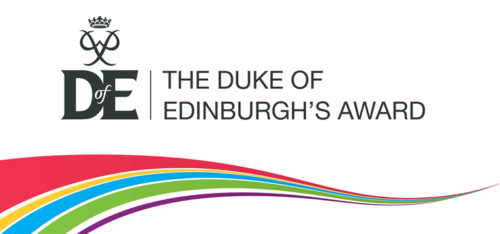
The Duke of Edinburgh Award is a programme available to 14–24-year-olds. It is undertaken by thousands each year, and in 130 countries. You might hear the award referred to as DofE for short. It is a personal challenge that empowers young people to develop valuable skills, overcome obstacles and build confidence and resilience.
There are three levels of DofE Awards – Bronze, Silver and Gold. Each level requires participation in a range of activities, which when successfully completed will lead to an award. Bronze and Silver involve four sections, whilst the Gold Award has five sections. You are required to participate in each section for a set amount of time – the time varies depending on which award you are working towards.
To gain a Duke of Edinburgh Award you are required to volunteer. Volunteering means that you spend some of your time helping other people, society, or animals without receiving payment – there are many options when it comes to voluntary work. Volunteering can be a great way to meet new people too!
The physical section of DofE requires you to participate regularly in a sport or other fitness activity. This could be anything you enjoy, from football to dance to hockey. Usually, you should play your chosen sport at least once per week.
To complete the skills section, you will need to choose an activity to improve in or learn about. It shouldn’t be a physical skill such as football as this would come under the Physical section. Your skill could be almost anything, but some of the most common DofE skills are playing an instrument, drawing, cooking, and photography.
The expedition section requires you to organise, train for and complete an expedition in a team.
 For all expeditions you will need to stay overnight for at least one night. There are a range of travel modes you can choose from, including walking, cycling, and kayaking. For Silver and Gold awards, you must also complete a presentation following the expedition.
For all expeditions you will need to stay overnight for at least one night. There are a range of travel modes you can choose from, including walking, cycling, and kayaking. For Silver and Gold awards, you must also complete a presentation following the expedition.
To receive a Gold award, you must complete an extra residential section. This involves five days (four nights) undertaking an activity or course in a setting away from home with people who you do not know. Popular places to stay include activity centres, campsites and boats. The residential section offers a great opportunity to try something different and meet new people.
Completing DofE is a huge personal achievement and there are so many benefits of undertaking the challenge.
DofE will improve your teamwork, communication, and leadership abilities. These qualities are valuable to have on your CV in the future. Having your award will tell potential employers or university admissions staff that you hold important life skills.
DofE is also a great way to make new friends. The expeditions and residential sections make for great bonding experiences. Many people who complete DofE together stay friends for life!
Last but not least, DofE is fun! You get to spend time with friends, take part in activities you enjoy and develop new interests too.
This article appears in the following categories Boarding School Life, School Admissions, Students
"*" indicates required fields








© 2024 Academic Families | Academic Families is a Safer Recruiter